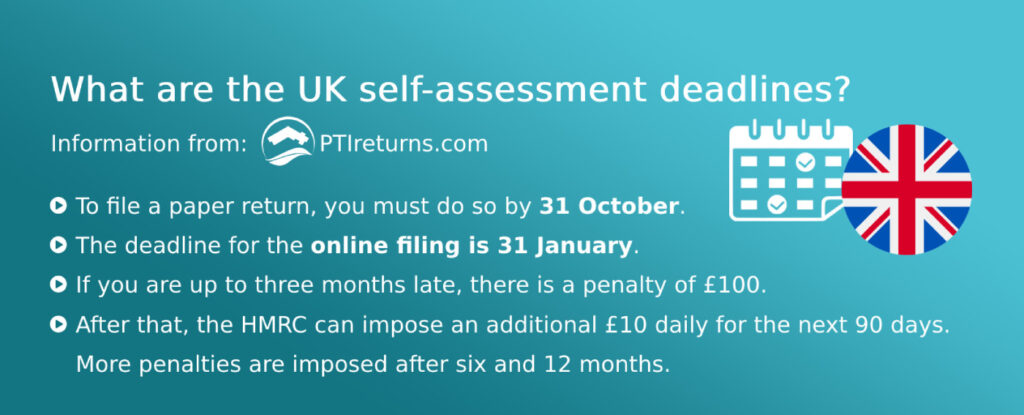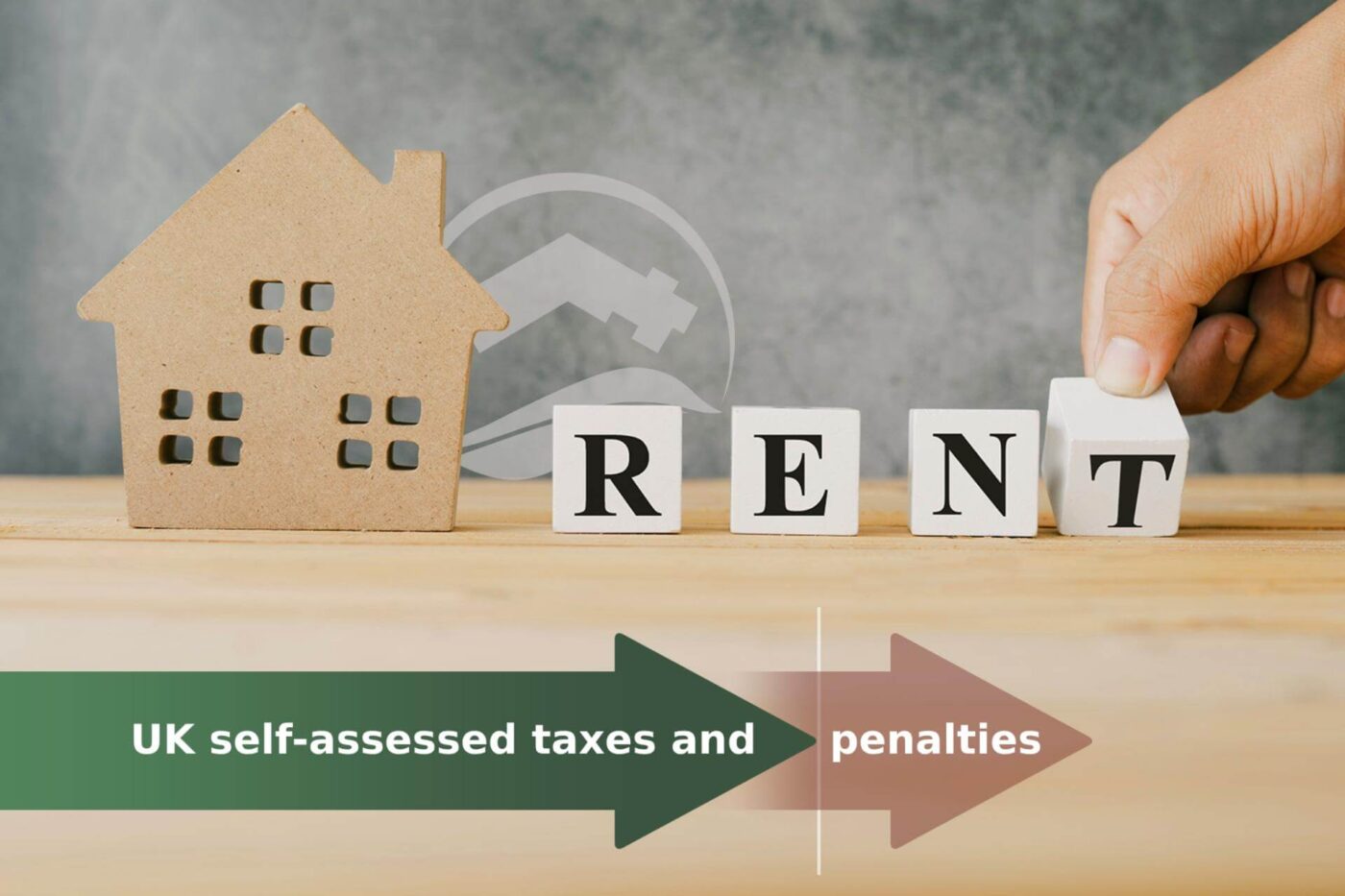Last Updated on October 16, 2025
If you own a property in the UK but live outside of the country, you will have to file a landlord tax return (UK income tax return) with the HMRC.
HMRC uses self-assessment to collect income tax outside the PAYE system. In most cases, this tax is deducted automatically from wages, pensions, and savings. But if you earn income outside the PAYE system where tax is not deducted at source, you must report it in a tax return. The same applies if you have a rental income from a property in the UK.
There are two options to consider when filing your UK property tax return.
Firstly, you can file directly yourself with HMRC. But if you would like a hand filing your documents, you can also contact a tax agent – like Property Tax International – PTI Returns – who can help you through the process.
In this guide, we are going to examine why it is so important to file your UK rental property tax return on time and show you how to easily file your documents online.
What are the property tax filing deadlines?
Most people choose to handle their self-assessment online, but you can file a paper property tax return if you prefer.
The tax deadline for filing and paying tax on rental income in the UK is 31 January 2026.
Online self-assessment tax returns must be submitted by 31 January after the end of the tax year (i.e. for 2025, this is 31 January 2026).
Self-assessment tax returns for the previous tax year can be filled out online. However, penalties for late filing will be imposed.
Read more:
Rental Income Tax in the UK – A Guide for Landlords
What if I miss the HMRC self-assessment deadline?
If you don’t file your UK rental income tax return on time, you may incur fines and penalties.
If you are up to three months late, there is a penalty of £100. After three months, the HMRC will impose an additional £10 daily for the next 90 days, increasing the total penalty to £1,000. The fine is imposed automatically, regardless of whether you owe tax or not.
Where the failure is prolonged beyond six or twelve months, there are further penalties of either £300 or 5% of the tax liability on the return (whichever is the greater).
Additional fines for late payment in the UK
| 30 days late | 5% of the tax due |
| 6 months late | A further 5% of tax outstanding |
| 12 months |
A further 5% of tax outstanding |
By knowing your UK tax obligations, you can keep your tax bill regular if you don’t miss the HMRC self-assessment tax return deadline. You can also turn to a property tax advisor, to follow all filing deadlines for you, and also help you claim all possible rental property tax reliefs.

Are all property owners required to file a tax return?
Self-assessed tax returns are not just for the self-employed.
You are required to file a UK rental income tax return if:
- You are a landlord
- You are a commercial rental property owner
- You have £2,500 or more in untaxed income, for example from renting out a property (you need to contact the HMRC if your income was between £1,000 and £2,500)
- You have made a profit from the sale of a property (you have a capital gains tax liability)
Check out also Top Tax Advice for Foreigners who Own Property in the UK
What information will I need to fill in my UK property tax return?
Before you start the process, make sure you have:
- your Unique Taxpayer Reference (UTR)
- your National Insurance number
- P60 or other records showing how much employment income (if any) you received that you’ve already paid tax on.
- details of your untaxed income from the tax year, including income from renting out a property, self-employment, interest, and dividends on shares
- records of any expenses relating to your rental income and/or self-employment income
- any contributions to pensions or charity which might be eligible for tax relief
Who can help me file my UK rental tax return?
At Property Tax International (PTI Returns) our team of tax advisors specializes in international property tax returns for overseas property investors. PTI Returns provides a wide range of UK tax services for investors and property owners. We’re a registered agent with HMRC and have over 25 years of experience.
With our help, you will never miss the deadline, pay too much tax, or find yourself on the wrong side of HMRC.
And the best part? The entire process is online!
Contact the PTI Returns team today for a free, no-obligation quote for your UK property tax requirements.

Learn more about your UK self-assessment
FAQs for non-resident property tax return in UK
Is renting out property worth it in the UK?
Renting out property can be worthwhile, but it hinges on:
- Income goals vs costs: Higher rents can yield strong income, but UK landlords are facing rising costs such as mortgage interest, maintenance, agent fees, insurance, and regulatory burdens.
- Market strength: Rental demand remains high, though rent growth is slowing across the UK.
- Long–term asset gain: UK property tends to appreciate moderately, but the level of appreciation depends heavily on factors like area, economic shifts, and local governance.
- Regulatory environment: Increasing regulation (e.g. licensing, renter protections) raises compliance cost and risk.
For investors with robust planning, expense buffers, and well-planned exit strategies, renting out property in the UK remains a perfectly viable investment vehicle.
What is a good return on investment in property in the UK?
Expected return on an investment property is highly dependent on factors like location and strategy:
- Across the majority of the UK, gross rental yields of 4-6% can be expected.
- Higher yields (8%+) can be found in lower-priced regions but come with higher tenant risk.
- In prime locations, total returns (capital + rental growth) average a respectable 6-8% per annum.
Of course, like any investment, additional factors like capital gains, tax treatment, and void periods must be factored in.
What is the average rent in the UK?
Rents vary across the UK but according to the Office for National Statistics (ONS):
- UK average (all areas): £1,343/month.
- England: £1,398; Wales: £807; Scotland: £999; Northern Ireland: £855.
Rent growth has slowed and even fallen recently in some areas of the UK, easing affordability pressures slightly. Despite this, London remains the outlier with a monthly average rent of £2,712.
Can a foreigner be a landlord in the UK?
Yes, non-UK residents and foreign nationals can legally own and let UK property.
However, there are some things to be aware of:
- Non-residents must adhere to the Non-Resident Landlord Scheme (NRLS), where tax on rental income is either deducted at source or paid via self-assessment.
- You must register with HMRC (if not already registered) and file Self-Assessment returns for rental income.
- Beyond tax, the usual landlord obligations still apply (e.g. licensing, safety rules).
Do I need a licence to rent out my property in the UK?
A licence may be needed to rent out a property in the UK under certain conditions:
- HMO (House in Multiple Occupation): If you are letting to 3 or more unrelated people sharing facilities (toilet, bathroom, or kitchen), many councils require a HMO licence.
- Some councils also have the power to impose additional or selective licensing to tackle problems in their areas caused by:
- Low housing demand
- A significant and presistent problem caused by anti-social behaviour
- Poor housing conditions
- High levels of migration
- High levels of deprivation
- High levels of crime
- If it’s a standard single-family rental, typically no licence is required, but check your local council’s rules for specifics.
How much is a landlord licence in the UK?
Costs for landlord licences vary by council and type:
- HMO licence: Often ranges from £500 to £1,500, with some councils charging additional renewal fees. The fees are dependent on property size.
- Selective licensing: The average charge for landlords across the UK is £700, although some councils charge hundreds more.
Due to the large discrepancies in fees, the best results come from checking your local council’s website for exact fees.

